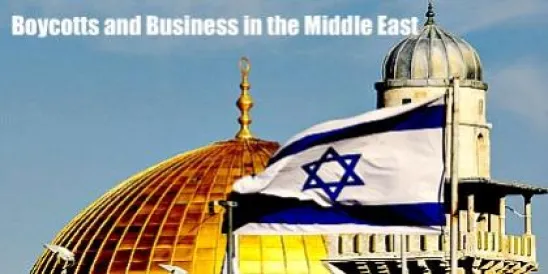Don't you just love when Chief Justice Roberts goes all 19th Century?
I know I do.
Last week the Court had occasion to revisit Marbury v. Madison, the quintessential judicial power cage match.
In Marbury, Chief Justice John Marshall performed the best feat of judicial judo ever, purporting to restrict the court's jurisdiction, but aggregating power to the court by claiming the right to declare an act of Congress--the Judiciary Act of 1789--unconstitutional.
In Zivotofsky v. Clinton, another chief justice named John (Roberts) did his own judicial Judo. He again protected the "province of the judicial department to say what the law is." And yet, he refused to say what the law was.
After the jump, when middle east politics aren't a political question.
Where is Jerusalem?
Google Maps says it is in Israel, and the search engine even finishes the search query by supplying the name of that nation state.
But of course other political powers also claim that city, whose borders have been settled in war and unsettled in peace.
So the Secretary of State and the President don't want to make a fuss. They claim the power to recognize international boundaries, and they will only list "Jerusalem" on the passport of an American born in Jerusalem. The State Department Foreign Affairs Manuals specifically directs that passport officials not write "Israel" or "Jordan" when recording an American birth in Jerusalem.
Yes. there is a manual on such things.
Not so fast, says Congress. Congress is convinced that the 1967 war has stuck, and it enacted a statute in 2002 providing that Americans born in Jerusalem may elect to have "Israel" listed as their place of birth.
President Bush signed the law, but also issued a signing statement to the effect that this passport business intrudes on the power of the executive branch.
And then Menachem Binyamin Zivotofsky, born in Jersusalem of American parents, decided to make a federal case out of it.
The lower courts refused to decide it, calling the issue of Jerusalem's status a "political question," meaning that it was not subject to judicial resolution. Chief Justice Roberts and the majority came to a different answer, but they did so by changing the question.
To them, political status was not in issue, only the limits of Congress' legislative power:
The District Court understood Zivotofsky to ask the courts to “decide the political status of Jerusalem.” . . . This misunderstands the issue presented. Zivotofsky does not ask the courts to determine whether Jerusalem is the capital of Israel. He instead seeks to determine whether he may vindicate his statutory right, under §214(d), to choose to have Israel recorded on his passport as his place of birth.
* * *
. . . The federal courts are not being asked to supplant a foreign policy decision of the political branches with the courts’ own unmoored determination of what United States policy toward Jerusalem should be. Instead, Zivotofsky requests that the courts enforce a specific statutory right. To resolve his claim, the Judiciary must decide if Zivotofsky’s interpretation of the statute is correct, and whether the statute is constitutional. This is a familiar judicial exercise.
Nobody disputed what the statute said or what it meant, the only question was whether Congress could control what is put on passports, or whether that was a power vested in the executive branch. If the latter, then the statute would be unconstitutional.
And courts have been doing that since John Marshall's 19th century judo throw--Marbury v. Madison:
At least since Marbury v. Madison, 1 Cranch 137 (1803), we have recognized that when an Act of Congress is alleged to conflict with the Constitution, “[i]t is emphatically the province and duty of the judicial department to say what the law is.” . . . That duty will sometimes involve the “[r]esolution of litigation challenging the constitutional authority of one of the three branches,” but courts cannot avoid their responsibility merely “because the issues have political implications.”
The Court then went through a detailed exposition of the constitutional arguments of both sides. Constitutional clauses and articles thrusted and parried. Angels danced on the heads of pins. It was all very unusual to spend so much time on it, though because, having determined that the courts have the right to decide the question . . . .
The Court ultimately refused to decide the question. The court said, it's best if we don't go first.
Because the District Court and the D. C. Circuit believed that review was barred by the political question doctrine, we are without the benefit of thorough lower court opinions to guide our analysis of the merits. . . . Ordinarily, “we do not decide in the first instance issues not decided below.” . . . In particular, when we reverse on a threshold question, we typically remand for resolution of any claims the lower courts’ error prevented them from addressing. . . . We see no reason to depart from this approach in this case. Having determined that this case is justiciable, we leave it to the lower courts to consider the merits in the first instance.
Humble and assertive, all at the same time. Very Marshallesque.




 />i
/>i
